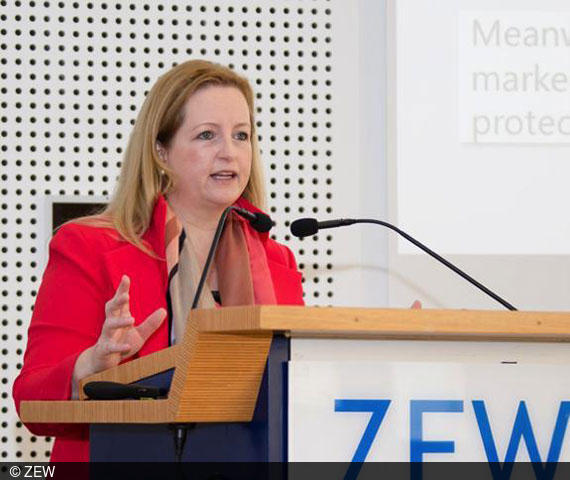Youth Poverty on the Rise – IMF Experts Yackovlev and Chen Visit ZEW
Dates and NewsOn 16 February 2018, Tingyuen Chen and Irene Yackovlev from the International Monetary Fund (IMF) presented the IMF research paper “Inequality and Poverty across Generations in the European Union” at the Centre for European Economic Research (ZEW) in Mannheim. In their speech, the IMF economists shed light on the effects of unemployment and the long-term consequences of insufficient social protection of young people in Europe.
What are the reasons for inequality across generations in Europe? How can policy-makers ensure that Europe’s youth does not fall further behind the rest of the population? The research paper from the IMF series “Staff Discussion Notes” deals with these central questions on the widening gap between young and old. Since the report’s publication in January 2018 by IMF Director Christine Lagarde in Davos, IMF economists have been visiting leading political institutions and research centres to present and discuss their findings. This way, IMF experts not only gather valuable insights from international experts, but also encourage public debate on youth poverty in Europe.
Gap between the generations is widening
The gap between the generations in Europe has increased considerably compared to the years before the global financial crisis. While the relative poverty of young (18–24) and elderly people (65+) was very similar before the crisis, the past few years have seen a significant increase in the poverty risk among young people. For older people, on the other hand, the risk of poverty has decreased considerably. According to the IMF study, this development can mainly be attributed to labour market and fiscal policies. As a result of the ageing population in Europe, most income support systems are designed to prevent poverty in later life. At the same time, however, child and youth poverty have been increasing over the last years. Social systems are currently ill-equipped to meet the challenges associated with child poverty and high youth unemployment rates. As a result, one in four young Europeans are at risk of poverty, meaning that their income corresponds to less than 60 per cent of the national median disposable income.
<o:p></o:p>
What should European policy-makers do?
After presenting their findings, the IMF economists discussed potential political solutions which could help to reduce inequality and poverty across generations in Europe. The overall aim is to make sure that today’s youth does not fall further behind the rest of the population. The recommendations provided by the economic experts concern three main areas: the labour market, social protection, and tax systems. For instance, the IMF economists proposed that investments be made in education and further training. This would help young Europeans to build up their skills and improve their employment chances in the future. With respect to social security, the economic experts emphasised the need to adjust social spending. Especially when it comes to unemployment and retirement benefits, Europe has a lot of catching up to do in order to ensure that social systems offer adequate protection for the young. Finally, the IMF experts called for a more progressive tax system and wealth taxes. These measures could help finance urgently needed social programmes for Europe’s youth.
Cutting-edge research findings presented in ZEW Research Seminar
The IMF research paper was presented within the framework of a ZEW Research Seminar. About every two weeks, ZEW researchers as well as external lecturers provide an insight into the current position of selected research areas and research projects. Quarterly highlights of this series are reports of renowned national and international researchers.
<o:p></o:p>

